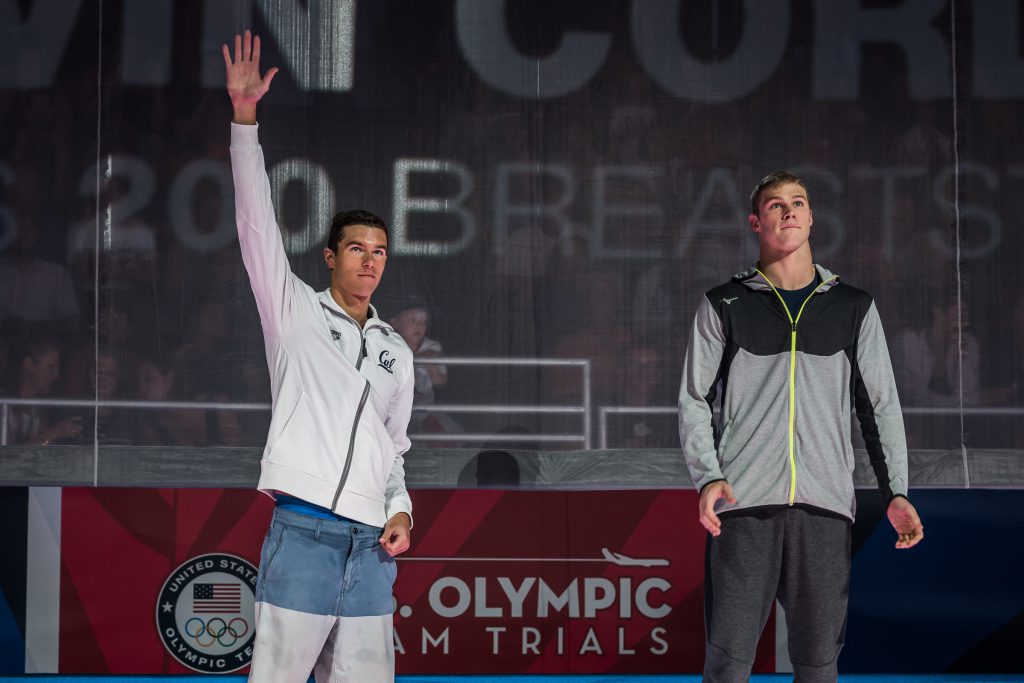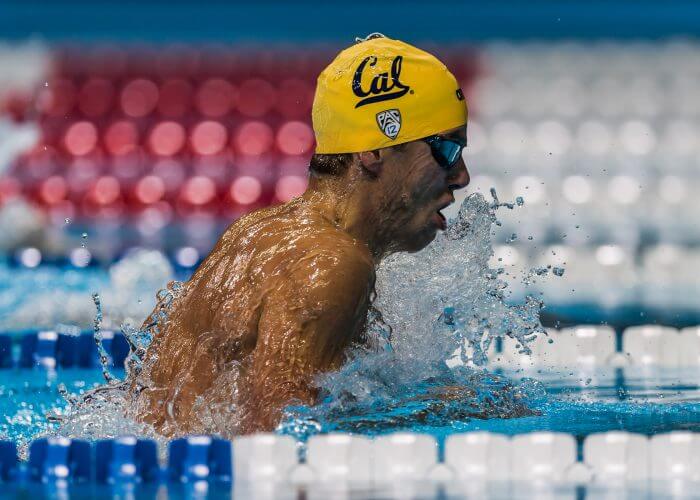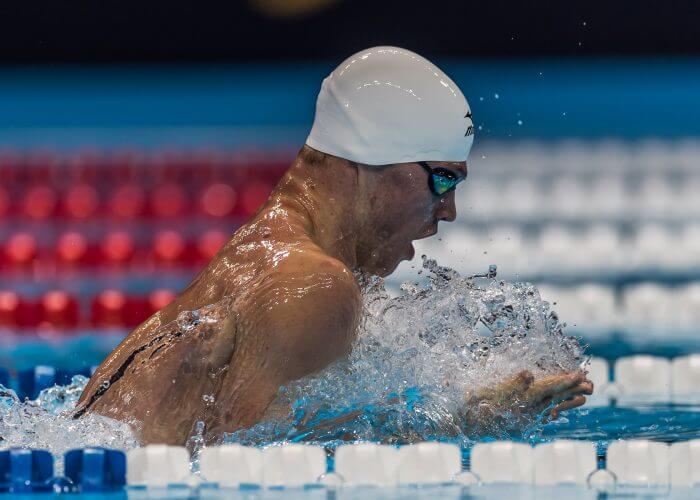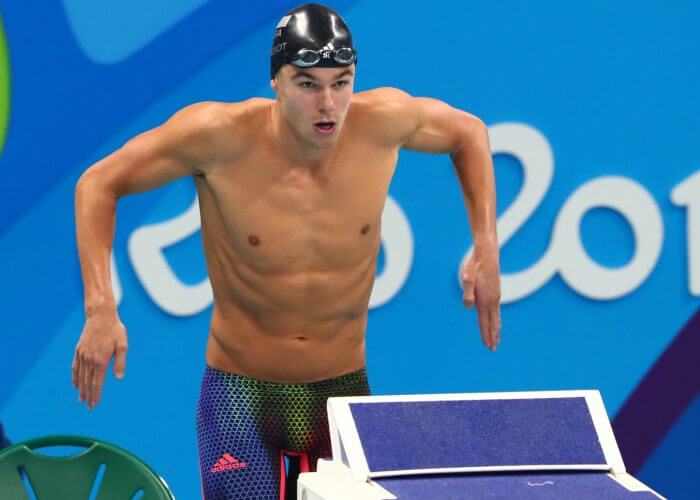2016 Trials Throwback: Josh Prenot Breaks American Record in 200 Breaststroke With Cordes in Tow

Each day during the pre-scheduled days of the 2020 US Olympic Trials, Swimming World will take its readers back four years to the 2016 Trials in Omaha to recap each event, and will offer some insight into what the events will look like in 2021.
The men’s 200 breaststroke was set to be one of the most competitive races at the 2016 Olympic Trials with a plethora of contenders that could challenge for a medal in Brazil. It was predicted that it would take a 2:10 to make the final and four would swim under 2:09, which would have been the deepest field in U.S. domestic history at the point.
Kevin Cordes was the top seed coming in and he was expected to challenge the American record of 2:07.42 set by Eric Shanteau in 2009. The world record of 2:07.01 was not far off, and Cordes’ long and strong stroke made it seem like he was the perfect prototype of what a 200 breaststroker should look like. In the heats and semifinals he turned under world record pace with 50 meters to go, swimming a 2:07.81 in semis to lead the qualifiers. Cordes was already on the team for the 100 breast, and the 200 was his strength. After Katie Ledecky missed her own world record in the 400 free earlier in the meet, many fans were salivating at the chance of seeing a record of some kind from Cordes in the 200 breaststroke – many were preferring to see a 2:06 from him.
Then there was NCAA champion Will Licon, who was our pick to make the team behind Cordes before the meet. He had set the American record in yards just three months prior and was in the best shape of his life. Licon’s best shot was the 200 breast, and he scratched out of the 200 IM to ensure he was 100% at his best for this final.

Josh Prenot. Photo Courtesy: Peter H. Bick
Josh Prenot was another that scratched out of the 200 IM to focus on this event. He had finished third in the 100 breast final with a monster second 50, showing that he was ready to peak in the 200. Prenot was another swimmer that was in the best shape of his life as he was second to Licon at NCAAs and was the national champ in the 400 IM. He was the gold medalist in the World University Games the year prior and was in the perfect position to make his first Olympic team.
Will Licon. Photo Courtesy: Peter H. Bick
22-year-olds Nic Fink and Andrew Wilson were also expected to factor into the top two. Fink had been swimming particularly well that summer, hitting a 2:09 just three weeks prior at the Indianapolis Pro Series. But Fink had not swum as well in the 100 earlier in Trials in finishing seventh. Did he have it in him to put that swim behind him and make it in the 200?
Wilson had taken a redshirt year from Emory University and was seeded fifth on the psych sheet. He was a popular sentimental favorite as no Division III swimmer had made a U.S. Olympic team and Wilson had a serious chance at making it here in the 200. He was fifth in the 100 earlier, and if any of the other guys faltered, he was likely to factor in to the top two.
Cody Miller was already on the team by virtue of his second place in the 100 and he was going to be able to let loose in the 200. But that was his secondary event, so he was going to need the race of his life to get by 200 specialists Licon and Prenot.
It was expected that it would take an American record to win, and the crowd was on edge leading into that final at the 2016 Trials.
The Race
As expected Kevin Cordes took it out hard. At the 50 he was under world record pace with a 28.49, turning seven tenths under pace, followed by sprinters Miller and Wilson. As the crowd got progressively louder with each stroke, Cordes was looking strong and in control. After becoming the first man to swim a 1:48 in yards, he had a lot of hype around him to see what he could do when he got to long course. As he turned a second under world record pace at 1:00.77, it looked like his potential was finally coming to fruition.

Kevin Cordes. Photo Courtesy: Peter H. Bick
Licon was now in second with Miller in third.
Cordes was still going strong on the third 50, and turned even further under world record pace at the 150. The crowd was now in a frenzy as it seemed possible that the first world record would fall at the 2016 Trials. Prenot was surging, as he had the fastest third 50 split and was now in second with Licon right there in third. It was a three man race on the final length.
With 25 to go, Cordes was tightening up and Prenot drew even. Licon was creeping up as well, and it almost looked like a repeat of the 2008 Trials when heavy favorite Brendan Hansen finished fourth. With the world record line in view, Prenot was in front of it but it was starting to creep past him. As he lunged for the wall, he touched at 2:07.17 – a new American record. Cordes just held on for second at 2:08.00 while Licon was in third at 2:08.14.
- Josh Prenot, 2:07.17
- Kevin Cordes, 2:08.00
- Will Licon, 2:08.14
- Andrew Wilson, 2:09.35
- Cody Miller, 2:10.22
- BJ Johnson, 2:10.70
- Nic Fink, 2:11.55
- Brendan McHugh, 2:14.88
On to Rio
The men’s 200 breast final was one of the tightest of the entire Games. With 50 meters to go, all eight men had a shot at a medal and when all of them lunged for the wall, the entire arena turned to see what the outcome was since it was impossible to discern with the naked eye. Josh Prenot walked away with the silver medal while Cordes fell to eighth. It was the first medal for an American in this event in 12 years as Kazakhstan’s Dmitriy Balandin won gold and Russia’s Anton Chupkov won bronze.
Heading into next year, Prenot and Cordes are still contenders to swim in Tokyo, but have fallen slightly to underdog status. Cordes won the 2017 national title and has since moved to the University of Georgia to train alongside Wilson and Fink. Prenot was the 2018 national champ and was 13th at the World Championships last year.

Josh Prenot. Photo Courtesy: Rob Schumacher-USA TODAY Sports
2016 Trials Throwbacks:
Day 1:
Day 2:
Day 3:
Day 4:



